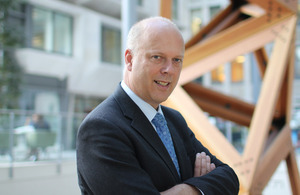Mentoring Scheme reduces reoffending
A scheme to mentor and rehabilitate prisoners sentenced to less than 12 months has reduced re-conviction rates, figures published today show.

The pilot, being run at Peterborough prison by Social Finance with support from a number of voluntary organisations, has helped prisoners who would previously have had no support. It provides them with help as they prepare for release and then to access the services they need, including housing, employment, financial services and substance abuse services once they are out of prison.
The re-conviction rate at Peterborough was previously considerably higher than the national average. Between September 2008 and March 2010 Peterborough had a re-conviction rate of 41.6 per cent (national average 37.3 per cent) and the frequency of re-conviction events was 87 per 100 prisoners (69 per 100 offenders nationally).
Between September 2010 and March 2012 Peterborough’s figures had fallen to a re-conviction rate of 39.2 per cent, with re-conviction events down to 81 per 100 offenders. Nationally, re-conviction rose to 39.3 per cent and re-conviction events had increased to 79 per 100 offenders.
Ministers are planning, for the first time, to offer this sort of support to all prisoners serving less than 12 months. That legislation is currently going through Parliament in the Offender Rehabilitation Bill.
Justice Secretary Chris Grayling said:
‘These figures are very encouraging. The Peterborough pilot is the sort of approach I want to see rolled out to all offenders leaving prison. It is madness that we release prisoners serving short sentences without any support in the community. We cannot be surprised that so many of them go on to commit more crimes and that’s why these changes are necessary. “These figures show a sizeable fall in re-convictions. They clearly demonstrate that with targeted support and help aimed at the right people at the right time we can divert more offenders from a return to crime.’
In other statistics published today, a scheme at Doncaster prison which supports released offenders to turn their back on crime, showed promising early figures. This scheme compares the re-conviction rate in 2009 with now.
The numbers show that Doncaster has a lower re-conviction rate between October 2011 and March 2012, compared with the same months in 2008-2009 and 2009-2010.
The scheme in Doncaster differs considerably with the scheme in Peterborough and has adopted a different rehabilitation approach. This scheme also deals with all offenders, not just those serving sentences of less than a year.
Notes to editors
What is a re-conviction event?
A re-conviction event is where an offender leaves prison and within a specified follow-up period (in this case, six months on leaving prison, plus a further three months) is convicted at court of a further offence. The final results of the Peterborough and Doncaster pilots will be based on a 12 month re-conviction measure and a further 6 month period (allowing time for cases to progress through the courts).
What is happening at the Peterborough pilot?
The pilot is providing additional services, funded through new investment to short sentence prisoners who are not normally subject to statutory supervision on release from custody. A range of voluntary and community sector organisations provide mentoring support for offenders, focusing on the individual needs of each prisoner to help them access the resources and support they will need on release to break the cycle of offending.
What is happening at the Doncaster pilot?
A new community based team of case workers in South Yorkshire works closely with the prison to ensure that support for offenders continues post release and that they receive the services they require within the community.
There is an increased role for voluntary and community sector organisations delivering rehabilitation services in the prison and through-the-prison-gate into the community.